Donner - Euwe, Amsterdam 1977 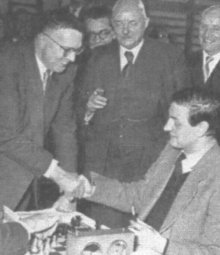
Donner - Euwe, Amsterdam 1977
1.d4 d5 2.c4 dxc4 3.Nf3 a6 4.e3 Nf6 5.Bxc4 e6 6.O-O c5
7.a4 Nc6 8.Qe2 Be7 9.dxc5 Bxc5 10.e4 e5 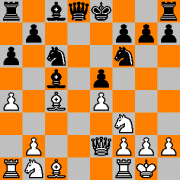 (see diagram) 11.h3 "11.Bxf7+ (see diagram) 11.h3 "11.Bxf7+ would of course have won immediately," Donner wrote. It isn't that of course - there follows Kxf7 12.Qc4+ Ke8 13.Qxc5 Nxe4 and Black is OK. Instead, 11.Ng5! wins a pawn: Be6 (0-0 12.Nxf7 etc.) 12.Bxe6 fxe6 13.Nxe6 Donner: "He did all he could to oblige me, but apparently, I just couldn't do it anymore." 11...O-O 12.Nc3 Nd4 13.Nxd4 exd4 14.Nd5 Nxd5 15.Nxd5 Be6 16.Bxe6 fxe6 17.Qd3 Ba7 18.Bd2 Rc8 19.Rfc1 Qd7 20.b3 h6 21.Rxc8 Rxc8 22.Rc1 Rxc1+ 23.Bxc1 b5 24.axb5 axb5 25.Bd2 e5 draw. "Things should be left at that," Donner wrote. Euwe died in 1981, Donner in 1988. 1954: Euwe congratulates Donner on dethroning him as champion of the Netherlands.
118. 22 May: Elementary, my dear Alexes 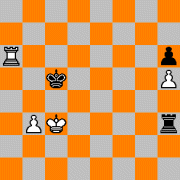 In the second round of the Astana tournament, there was a remarkable case of double chess blindness. In the position on the left, from Shirov - Morozevich, White played 55.Kb2? (Kc2!) and now 55...Kb4?? 55...Rxh5 was perfectly possible: 56.Ra5+ Kb4 57.Rxh5 stalemate. Now, White won after 56.Rb6+ Kc5 57.Rxh6 Kb4 58.Kc2 Rc3+ 59.Kd2 Rh3 60.Rh8 Kc5 61.Kc2 Kb5 62.Kd2 Kc6 63.h6 Kb7 64.b4 Ka7 65.Ke2 Rh4 66.Kf3 Rxb4 67.Rg8 Rh4 68.Rg6 Kb7 69.Kg3 Rh1 70.Kf4 Kc7 71.Kf5 Kd7 72.Kf6 Ke8 73.Kg7 and Black resigned. In the second round of the Astana tournament, there was a remarkable case of double chess blindness. In the position on the left, from Shirov - Morozevich, White played 55.Kb2? (Kc2!) and now 55...Kb4?? 55...Rxh5 was perfectly possible: 56.Ra5+ Kb4 57.Rxh5 stalemate. Now, White won after 56.Rb6+ Kc5 57.Rxh6 Kb4 58.Kc2 Rc3+ 59.Kd2 Rh3 60.Rh8 Kc5 61.Kc2 Kb5 62.Kd2 Kc6 63.h6 Kb7 64.b4 Ka7 65.Ke2 Rh4 66.Kf3 Rxb4 67.Rg8 Rh4 68.Rg6 Kb7 69.Kg3 Rh1 70.Kf4 Kc7 71.Kf5 Kd7 72.Kf6 Ke8 73.Kg7 and Black resigned.
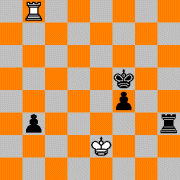 Even stranger is that this elementary stalemate trap had already occurred in top level chess. In the position on the left, from Bernstein - Smyslov, Groningen 1946, Smyslov played 59...b2?? There followed: 60.Rxb2 Kg4 (60...Rh2+ 61.Kf3 Rxb2 stalemate) 61.Kf1 draw. The tournament books adds that a few days before, Bernstein had shown Smyslov a similar stalemating manoeuver. Even stranger is that this elementary stalemate trap had already occurred in top level chess. In the position on the left, from Bernstein - Smyslov, Groningen 1946, Smyslov played 59...b2?? There followed: 60.Rxb2 Kg4 (60...Rh2+ 61.Kf3 Rxb2 stalemate) 61.Kf1 draw. The tournament books adds that a few days before, Bernstein had shown Smyslov a similar stalemating manoeuver.
117. 21 May: Chess, like banana peels, like flower pots falling from windows, has the power to make men laugh 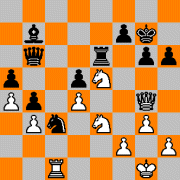 | This position, with Black to move, arose in the game Caoili (2097) - Epishin (2667), Malaga Open 2000. The grandmaster had not achieved a great deal against his humble opponent, when he finally saw his chance to win a pawn: 37...Qxd4 Because after 38.Qxd4, there follows the family check Ne2+ However, 38.Nf5+, and Black resigned. | 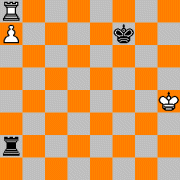 | White to move, Ojanen - Ridala, Helsinki 1959
I found this in a column by Gert Ligterink. Everybody knows how to win this: 1.Rh8, because after 1...Rxa7, there follows 2.Rh7+ and Rxa7. However: 1...Rh2+ and White resigned.
Every time I come across this diagram, it's the same with me as it was with Ligterink: I can't help laughing. |
116. 14 May: The bridge and the square Some time ago, to the disbelief of some readers, I mentioned that in Amsterdam, you can cross the Hein Donner bridge to reach the Max Euwe square. (See item 84 in this Diary.) It's something these two, who were for a long time Holland's only two grandmasters, could not have imagined when they first met in a family hotel in a provincial town in the East of the Netherlands, in 1943.
In 1977, Donner wrote in Schaakbulletin: "Just having turned sixteen, I had been sent to the countryside to feed up a little. There was this girl, too. At our first acquaintance, she lifted her skirt and asked if she had beautiful legs. A future great artist would have reacted differently - Goethe, Wagner, Mulisch (a Dutch writer and a friend of Donner's - TK), but I was paralysed with fright. I did in fact become a chess player, just having mastered the art at that point. That weekend, she turned out to be God's daughter, as well. In unfathomable goodness he granted me a game. A Slav opening, he won the endgame."
Being a true chess player, Donner was probably more excited about the fact that the girl's father was the former World Chess Champion Max Euwe, and the dream of perhaps being able to play Him a game, than about her legs. In those years, it was unimaginable for a schoolboy to challenge a grown-up, but when Euwe arrived, the prominence of Donner's father (a former Minister of Justice and a member of the High Court) assured that the families would have tea together, and when the ever obliging Euwe was told of the boy's chess love, he suggested playing a game after dinner.
Donner - Euwe, Winterswijk 1943
1.d4 d5 2.c4 c6 3.Nf3 Nf6 4.Nc3 dxc4 5.a4 Bf5 6.Ne5 e6 7.f3 Bb4 8.Bg5 c5 9.dxc5 Qxd1+ 10.Rxd1 Nd5 11.e4 f6 12.exd5 exd5 13.Rxd5 fxg5 (see diagram)
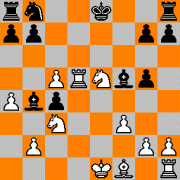 14.Bxc4 Black's opening has gone wrong; with 14.Nxc4 White would have obtained good chances. Now he was gradually put on the defensive. 14...Be6 15.Rd1 Bxc4 16.Nxc4 O-O 17.O-O Bxc5+ 18.Kh1 Nc6 19.Ne4 Be7 20.Rd7 Rab8 21.Na5 Nxa5 22.Rxe7 g4 23.Rd1 Rbd8 24.Rdd7 Rxd7 25.Rxd7 Rc8 26.Kg1 gxf3 27.gxf3 Rc1+ 28.Kg2 Rc2+ 29.Rd2 Rxd2+ 30.Nxd2 Kf7 31.Kf2 Ke6 32.Ke3 Kd5 33.Kd3 Nc6 34.b3 Nd4 35.h4 Nf5 36.h5 Ng3 37.h6 gxh6 38.f4 h5 39.Ke3 Nf5+ 40.Kf3 Kd4 and White resigned. The game, played without a clock, had lasted an hour. 14.Bxc4 Black's opening has gone wrong; with 14.Nxc4 White would have obtained good chances. Now he was gradually put on the defensive. 14...Be6 15.Rd1 Bxc4 16.Nxc4 O-O 17.O-O Bxc5+ 18.Kh1 Nc6 19.Ne4 Be7 20.Rd7 Rab8 21.Na5 Nxa5 22.Rxe7 g4 23.Rd1 Rbd8 24.Rdd7 Rxd7 25.Rxd7 Rc8 26.Kg1 gxf3 27.gxf3 Rc1+ 28.Kg2 Rc2+ 29.Rd2 Rxd2+ 30.Nxd2 Kf7 31.Kf2 Ke6 32.Ke3 Kd5 33.Kd3 Nc6 34.b3 Nd4 35.h4 Nf5 36.h5 Ng3 37.h6 gxh6 38.f4 h5 39.Ke3 Nf5+ 40.Kf3 Kd4 and White resigned. The game, played without a clock, had lasted an hour.
A very good game for a boy who had just been playing for two years, and Euwe praised his talent. In a novel about two chessplayers, this would be a decisive moment in the lives of both: the schoolboy suddenly realising his calling in life, the great man feeling guilty about the boy's social downfall, because Hein Donner had been cut out for something different than the bohemian and, in those years, destitute life of a professional chessplayer. (In the fifties, Donner was the only member on the Dutch teams who wasn't paid. The others, holding jobs, were compensated for their loss of income - he had nothing to be compensated for.)
Reality did somehow resemble this scenario. | | 1954: Euwe congratulates Donner on dethroning him as champion of the Netherlands. |
In 1954, Donner dethroned Euwe as a national champion, and some time later as the best player in the country, but compared to him, he was never more than a bridge to a square. And Euwe always helped him. He got him the only regular job he ever had (as a programmer with IBM), made him a contributor to books and magazines, and a FIDE-representative for the Netherlands. Shortly before Euwe's death, they made a propaganda trip together to the Arabic world.
Donner, who was at his best as a writer when he insulted, and who did that to everyone and everything in the Dutch chess world, always spared Euwe. He addressed him as Grandmaître, and in writing called him: "Thou great and good one." He never won a game against him. Almost all other prominent players of his generation managed to win a game against Euwe, but Donner never did. His last chance came in 1977, when God was 76, and the schoolboy 50.
|